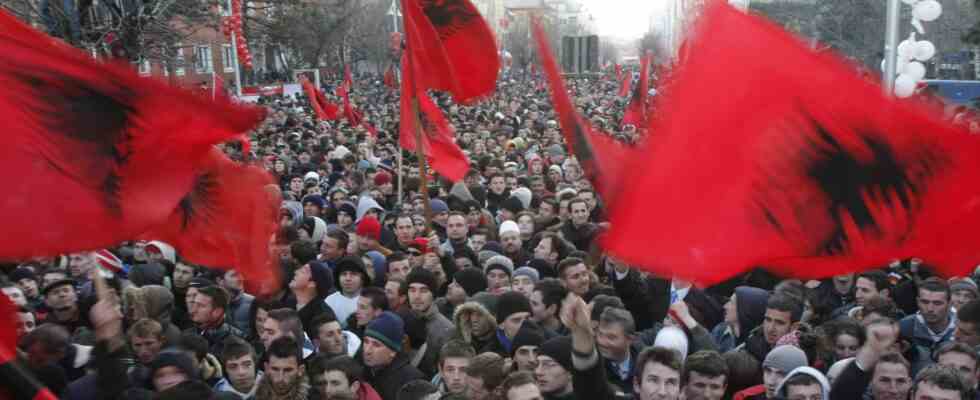Status: 02/18/2023 3:57 p.m
15 years after gaining independence, many Kosovars see their country’s development as a success story. Kosovo hopes to join the EU, but one important problem remains unresolved.
In the middle of the Kosovar capital Pristina there are seven huge letters. The artwork commemorates Independence Day. “NEWBORN” is written in huge letters. The letters were unveiled on February 17, 2008, when Kosovo’s independence from Serbia was declared in parliament in Pristina.
The artist behind the lettering is Fisnik Ismaili. Ismaili redesigns the monument every year, each time with a political message. In the next twelve months, the letters will glow in the Kosovan national colors of blue and yellow.
In addition, they are reordered. The new lettering: “NO NEW BR”. According to Ismaili, BR stands for “broken republic”. For the artist, Kosovo is in danger of collapsing.
So it’s about territorial integrity. Ismaili criticizes the idea of giving ten predominantly Serb communities in the country more autonomy. It is the political issue these days in Kosovo.
Behind this is the growing pressure from the USA and the EU on Serbia and Kosovo since the Russian attack on Ukraine. The Balkans should not become a new source of fire, Serbia and Kosovo should normalize their relations. The EU and the US are demanding that Kosovo fulfill an old promise: the founding of an association of Serbian communities.
A new message every year – a warning about the loss of statehood for the anniversary: the monument to Fisnik Ismaili in Pristina.
Image: REUTERS
Protection or division?
Four of them are in northern Kosovo, the largest being North Mitrovica. Politically, the “Serbian List” party, which is supported by the Serbian government, dominates here. But opposition Serbs are also in favor of more autonomy.
Aleksandar Arsenijevic, for example, who founded his own small party and defines himself as a Serb and a Kosovar. He believes that an association of Serbian communities would protect Serbs’ rights and prevent discrimination, which he complains about. “It would also reduce the very widespread fear of assimilation into Albanian society in the Serbian community.”
However, the government in Pristina and many Kosovo Albanians fear that a Serbian community association could divide or block the constitutionally multi-ethnic state of Kosovo.
“An enormous success story”
There is currently no solution in sight. Meanwhile, people in Kosovo have other things on their minds, says political analyst Demush Shasha, who heads a pro-European think tank in Pristina. They wanted better state care, such as better education and a better health system.
15 years ago, Shasha would not have believed that Kosovo is still fighting for international recognition and visa facilitation. Nevertheless, he thinks the country has come a long way.
“After 15 years, Kosovo is an enormous success story in terms of state building. After the war, many people didn’t even have a roof over their heads. After only 15 years of independence, we now have an extremely resilient democracy.”
time for normality
Fatmir Sejdiu is one of those involved in state building. He was President of Kosovo in 2008. For Sejdiu, it is now time for his country’s status to normalize.
The thought that Kosovo might have to make concessions to the Serbian minority is difficult for him. He thinks the Serbian minority has more rights than minorities in many other countries. Kosovo has promised to set up a Serbian association of municipalities. Thought is more as a loose organization.
“But the communities cannot form an institution the way they want, with executive powers. That is unacceptable.”
opportunity to make history
Ultimately, however, two other men will decide: Serbian President Alexandar Vucic and Kosovan Prime Minister Albin Kurti. Both have signaled cautious agreement to negotiations. But little has happened since then.
Political scientist Demush Shasha is convinced that both will not pass up the opportunity to maybe go down in history.
However, many people in Serbia and Kosovo are very skeptical about the dialogue. In any case, the artist Ismaili is very disappointed by the current developments: “As long as Serbia does not recognize Kosovo as independent, there should be no talks at all.”
Kosovo: 15 years independent – and now?
Silke Hahne, ARD Vienna, February 17, 2023 4:45 p.m

